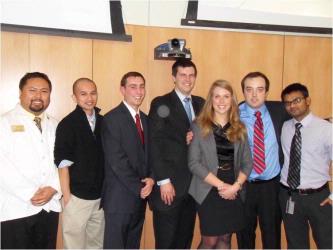Students Test Presentation Skills at Speech Competition
Annual competition pits students against each other in presentations to faculty posing as members of the General Assembly

By Andrew Haines
February 16, 2011
Advocating for the pharmacy profession and being able to do so effectively and persuasively are qualities that students at the University of Maryland School of Pharmacy work hard to develop. On Feb, 7, 2011, seven student pharmacists participated in a speech competition organized by the Society of Workforce Advocates in Pharmacy (SWAP) that tested their critical thinking skills and their knowledge of health care reform.
For the annual event, students prepared and gave ten minute presentations to a panel of faculty judges who were posing as elected officials in Maryland’s General Assembly. Presenters advocated before these “legislators” on a variety of pharmacy-related topics including medication therapy management (MTM) services, immunization services provided by pharmacists, and increasing the number of clinical pharmacists working in large hospitals.
“The speech competition showcases our student pharmacists’ involvement in health care advocacy efforts at the University of Maryland, Baltimore,” says Nikunj Patel, an organizer and participant. “It challenges us to think critically and encourages us to address our state’s and nation’s health care issues.”
Presenters included: William Albanese, a fourth year student who spoke on clinical pharmacy and improved outcomes; and third year students Erika Dranko, point of care testing; Paul Ortiz, immunizations in Maryland; Nikunj Patel, community pharmacy-based blood pressure management; Jeffrey Paup, the inclusion of pharmacists in the patient centered medical home; Czarlite Ricasa, expanding the role of pharmacists in medication therapy management, and Andrew York, including medical indication on prescriptions.
York won first place for his speech on inclusion of indications on prescriptions to ensure patient safety, promote patient education, and provide better medication therapy. Dranko received second place for her speech on approving and utilizing point of care testing to improve the treatment of chronic disease states within pharmacies in Maryland that meet regulatory training requirements, and Patel received third prize for his speech on an innovative program he envisioned called “My Heart” which would utilize pharmacists’ skills in blood pressure monitoring and heart screening to improve patient screening, interventions, and health outcomes. All three received prize money to attend a professional pharmacy conference or meeting.
Judges included Robert Beardsley, PhD, Cynthia Boyle, PharmD, FAPhA, and Cherokee Layson-Wolf, PharmD, from the School of Pharmacy, and Austin Ladic, PharmD, from Rite Aid Corporation. Presenters were critiqued on their relevance, supportive evidence, and delivery.
“The judges were very encouraged by the quality of work that the participants exhibited,” says Beardsley, who is a professor of pharmaceutical health services research. “We had difficulty choosing the awardees due to the overall quality of the presentations. We appreciated the opportunity to provide feedback to each participant on what could have been done differently.”
SWAP is a student-run taskforce of the School of Pharmacy’s Student Government Association. Its goal is to promote workforce and political education among student pharmacists and to encourage the development of skills and innovative events to further the profession of pharmacy and health care through leadership and evidence-based advocacy.
The speech competition was sponsored by a Walgreen’s Diversity Grant.
